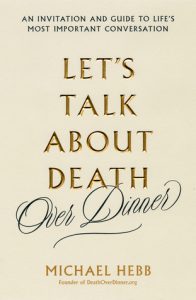 For increased mortality rates, that is. According to a mortality overview report by StatsCan for 2014-2016, the deadliest month in 2016 was December, followed by March, then February, then January (Figure 3, Seasonality of Deaths) – see how they’re all the winter months? It actually starts a bit earlier, in October & November, and stretches all the way till April – the months that had a higher average number of daily deaths than the annual average – but you can see that there’s a peak December through March. And seeing both as we’re headed into these deadly winter months as well as towards the start of our upcoming adult program, Crash Course in Death and Dying, I figure ’tis the season, then, to talk about death.
For increased mortality rates, that is. According to a mortality overview report by StatsCan for 2014-2016, the deadliest month in 2016 was December, followed by March, then February, then January (Figure 3, Seasonality of Deaths) – see how they’re all the winter months? It actually starts a bit earlier, in October & November, and stretches all the way till April – the months that had a higher average number of daily deaths than the annual average – but you can see that there’s a peak December through March. And seeing both as we’re headed into these deadly winter months as well as towards the start of our upcoming adult program, Crash Course in Death and Dying, I figure ’tis the season, then, to talk about death.
But it’s a bit of a taboo subject to bring up still, right? Or at least that’s the feeling I get whenever I do want to bring up death in conversation. So how do we start the conversation? Because it’s going to happen at some point in your life (well, if we’re talking about your death, it’s going to happen at a pretty predictable point in your life, actually: the end of it), and there are logistical matters to take into consideration even apart from the sentimental or spiritual aspect of it (e.g. what kind of funeral to hold, if holding one? how to deal with the body?), so it’s probably a good idea to think about it and write up your will & deal with your estate (with The Canadian Guide to Will and Estate Planning, 4th edition, for example) even before you start considering how close you may or may not be to your inevitable end or thinking about how to start talking to your loved ones about your choices.
And what better time to start thinking about wills & power of attorney, or advance care planning, than with the start of our program on death & dying that will cover Wills & Power of Attorney (Wed Oct 16, 7-8:30pm at the Bathurst Clark Resource Library with guest speaker Adam Giancola) and Advance Care Planning (Wed Oct 23, 7-8:30pm at the Bathurst Clark Resource Library with a guest speaker from Hospice Vaughan). Register for these talks/workshops now on Eventbrite! This has been changed into a drop-in program, so please come drop into the program!
But beyond that, I’d like to mention a few death-related materials to help you become more comfortable thinking and talking about death and dying, as well as to make it easier to initiate the topic of discussion with someone who might be otherwise disinclined to talk about it (which is not to say to force them to talk about it). This post is going to be focused more on how we can be more open in discussions about death and be more prepared for our own inevitable demise.
That said, let me introduce you to Let’s Talk About Death Over Dinner by Michael Hebb (pictured above), which is a collection of prompts to help you start the conversation about death with others, possibly over dinner, along with some of the answers that Hebb has heard over dinners throughout the years. Before Hebb gets to the prompts, he starts by making the case for talking about death, and it amounts to this: it’s an important conversation to have, and to avoid talking about it outright can stand in the way of experiencing what he calls a “good death” – that is, one where you get to die the way you’d like to, in the environment you’d like to die in (e.g. surrounded by family & friends, at home or in a hospital?, etc.). Here is just a selection of prompts that had me wondering what my own responses to these questions would be:
- If you were to design your own funeral or memorial, what would it look like?
- Do you have your will, advance-care directives, and power of attorney complete, and if not, why?
- Why don’t we talk about death?
- Would you ever consider doctor-assisted suicide?
- Are you an organ donor?
- What does a good death look like?
- What do you want done with your body?
- How long should we grieve?
- How do you end a conversation about death?
In case you’d like to host your own death dinner, Hebb also has you covered at the Death Over Dinner website, where you can generate templates & reading materials for your own death dinner conversation. It comes complete with an Australian edition, a Jewish edition, and a Brazilian edition so that you can host dinners around the world!
So now that I’ve hopefully got you all excited about talking about the inevitable, here are some reading recommendations in no particular order for further reading & watching! (I’ve also compiled a list on Bibliocommons for you to check out.)
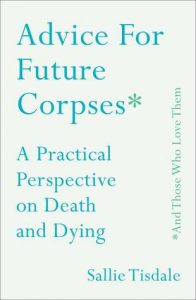 Advice for Future Corpses (and Those Who Love Them) by Sallie Tisdale
Advice for Future Corpses (and Those Who Love Them) by Sallie Tisdale
I love this title and the reference to the no-bull books, because in many ways, talking about death and facing your own mortality (and that of those around you) with your loved ones is a pretty no-bull topic. And removing the sentimental aspect of it as the main focus from the title was another touch that I am enjoying, in the sense that while there is definitely an emotional aspect to it, there’s also a whole lot of practical things to consider as well, from preparing your own end-of-life matters, writing a living will, considering organ donation, the option (or lack thereof, depending on where you live) of assisted death, among other things. Tisdale draws from her experience working as a nurse (over a decade of which in palliative care) to bring the reader a frank meditation on death and dying.
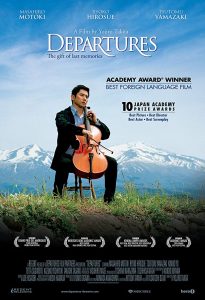 Departures (2008)
Departures (2008)
This Japanese film takes an unconventional approach to the subject of death, in that it faces death squarely as its main focus. The protagonist, Daigo, accidentally applies for a very hands-on job in the funeral industry when the newspaper ad misprints that the job is about “departures” rather than “the departed”. He learns how to send off the departed’s body in a respectful manner, allowing the grieving to say their goodbyes through the ritual, and throughout learns to take pride in what he does.
What I really love is that the film unflinchingly addresses the stigma associated with those working in the funeral industry, along with arguing for the importance of the existence of those working so intimately with the departed. It doesn’t assume that everyone in Daigo’s life approves of his choice to work for the agency, and it also shows how despite Daigo’s experience with other people’s grief, it doesn’t make it so that he will expertly be able to handle his own without help from those around him.
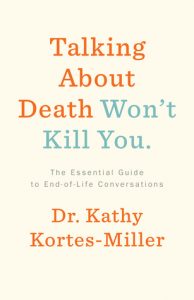 Talking About Death Won’t Kill You by Kathy Kortes-Miller
Talking About Death Won’t Kill You by Kathy Kortes-Miller
What to talk about, how to talk about it, and why we don’t talk about it. Kortes-Miller navigates the topic of death from how the advent of social media has changed the way we die (c.9: Posting, Tweeting & Texting – Dying in a Digital World), to bringing up death and figuring out ways to talk about it, to how to support someone who is dying and how to include children in the conversation.
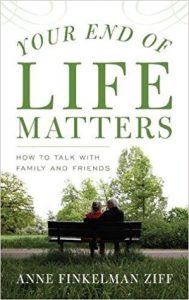 Your End of Life Matters by Anne Finkelman Ziff
Your End of Life Matters by Anne Finkelman Ziff
I love that the title can be read in different ways: as a book about your end-of-life matters/stuff, or as a book that insists that the end of your life does matter (perhaps contrary to the feeling you might get thinking about its importance based on how people might refuse to talk about it and give it the space to exist as a subject).
I just read about something like this (the winter mortality spike) in a book called The Year of Living Danishly by Helen Russell! I believe it had to do with suicide rates and the glum winter months causing a peak in those statistics, but I’m sure there are other reasons as well (hazardous road conditions?). This is a great subject to write and think about!! Thank you for putting it out there. I think that thinking about death is one of the easiest ways to sort out what really matters and to live well while we’re here.
That’s such a great way to put it! I feel like thinking about and coming to terms with death can serve to help us figure out how we want to live our lives. I can’t find the quote, but I remember a TA in a philosophy class once wrote it on the board, a translation most likely, along the lines of “Death is the least of all evils: before it arrives, you have naught to worry about, and when it is come, there will be no you to experience it”, which I thought was quite true (though it certainly doesn’t help much to console anyone who fears the process of dying rather than the death itself). We’re going to be having a few programs coming up, it looks like, on the topic of death (including the Crash Course in Death & Dying, there’s also a Hot Topics at Dufferin Clark on what constitutes a good death), so it looks like we’re getting the conversation started here at the library 🙂
I can see the spike in mortality happening especially with Denmark and other Nordic countries, considering the long winter months of very few hours of sunlight – it’d be interesting to see whether there’s a difference depending on latitude on how significant the effect of winter is on mortality rates (on Excess Winter Deaths). That title sounds like a fun read!
I think it’s great that the library is offering those programs—and I like that they’re drop in!
The Year of Living Danishly was an enjoyable read; I would recommend it!! It really, really makes you want to eat pastry, though. I’m not complaining, but I don’t think the two labour-intensive batches of cinnamon rolls made in quick succession surrounding the reading of this book were coincidental. 😉
Your post also reminded me of a speech I’ve come back to a few times over (it’s just so good): Steve Jobs’s commencement speech at Stanford University. https://www.youtube.com/watch?v=1i9kcBHX2Nw